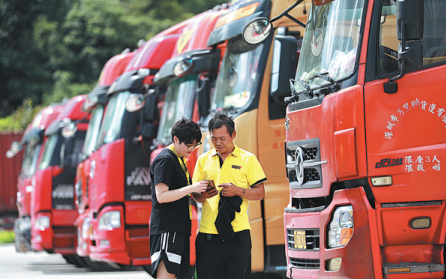Nation's logistics industry embraces start of greener, smarter era


BEIJING-In the face of multiple challenges including the COVID-19 pandemic and climate change, a lower-carbon and smarter logistics industry is emerging in China.
Liang Dalin, 48, has bid farewell to the traditional energy and time-consuming work style thanks to a mobile app. He now no longer needs to waste time searching for goods and waiting for their distribution.
"The app helps me locate the goods easily. I don't need to drive around looking for them anymore," said Liang, a transport truck driver.
The app is developed by Full Truck Alliance, also known as Manbang, which runs a domestic freight service platform. Using big data, the company helps truck drivers find goods quickly and reduces empty-load rates and fuel consumption, cutting carbon emissions by an estimated 330,000 metric tons in 2020.
"The global supply chain and logistics industry are facing unprecedented challenges due to deglobalization and other risks," said Hu Yadong, president of the China Communications and Transportation Association.
China's logistics industry ranked first in the world in freight volume, turnover rate and express delivery volume in 2020, said Wang Jianjun, director of the economic and trade department of the National Development and Reform Commission.
Wang added the country's logistics industry has maintained a sound momentum of development in recent years, with low overall costs and growth in transportation volume.
Xu Yahua, chief engineer with the Ministry of Transport, said developing green logistics is of great significance to sustainable development of the economy and society since the industry is a major player in energy consumption and carbon emissions.
The application of digitalization and other technologies to road transportation can effectively improve the efficiency of the transportation system, and help reduce vehicle energy consumption and carbon emissions, said a research study jointly conducted by the ministry and Manbang.
The research results showed that 69.51 million tons of carbon dioxide emissions can be reduced each year if the empty-load rate is lowered to 25 percent from 45 percent.
Data from China's leading logistics companies showed their investment in smart equipment exceeded 15 billion yuan ($2.35 billion) in 2020, and more than 370 intelligent distribution hubs have been built across the country. Artificial intelligence, big data and other cutting-edge technologies are widely applied in transportation, warehousing and packaging.
The total size of China's intelligent transportation market increased from 42 billion yuan in 2011 to 165.8 billion yuan in 2020, with an annual growth rate of around 20 percent, said the China Intelligent Transportation Systems Association.
"It is necessary to promote transformation and upgrading of the logistics industry with digital innovations, so as to boost high-quality economic development," Xu said.




































